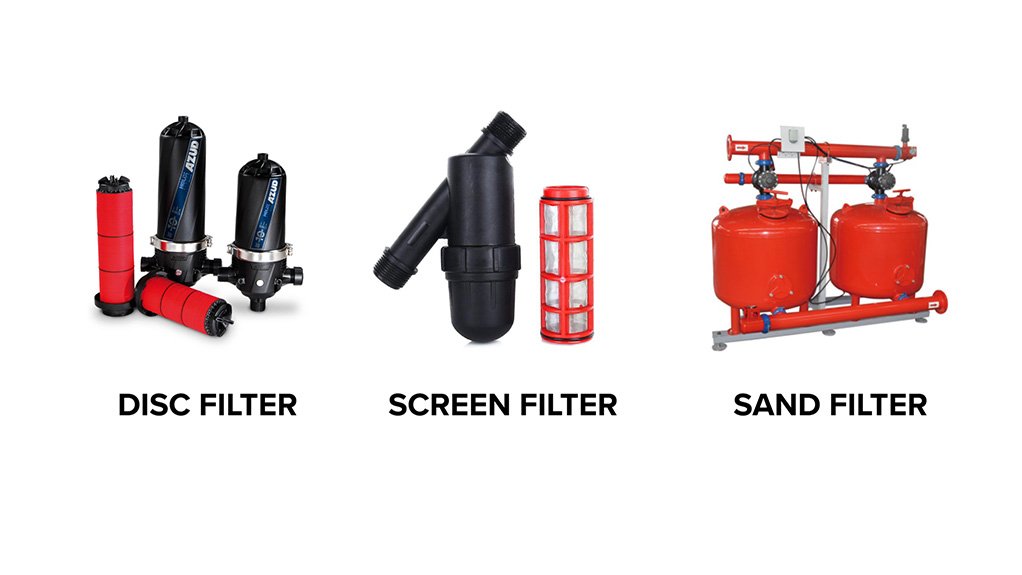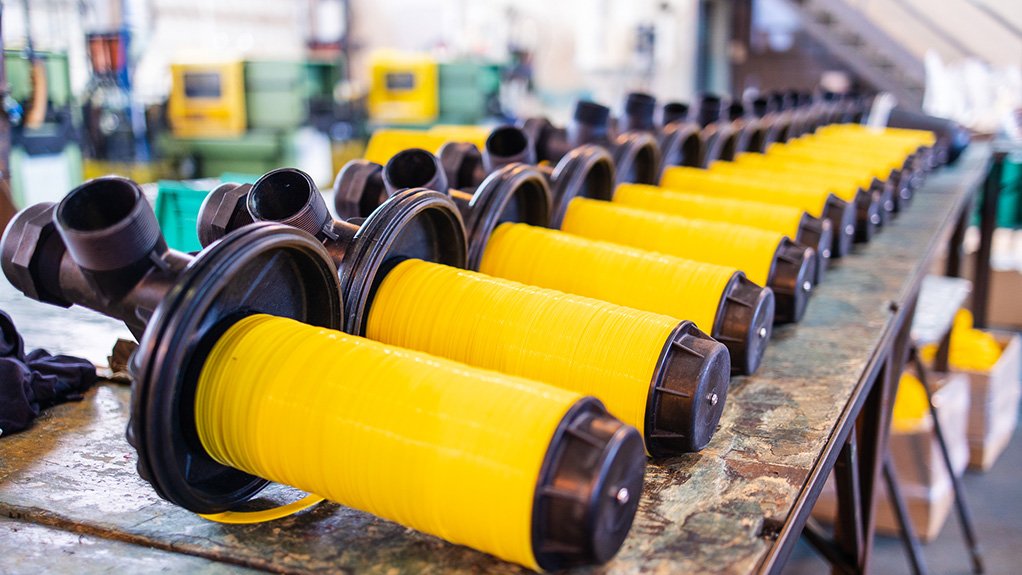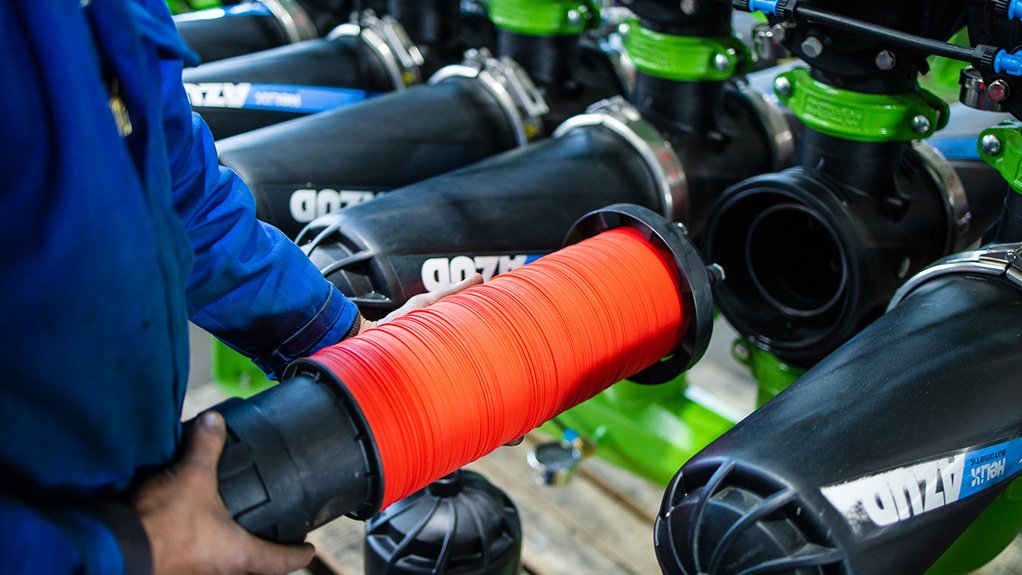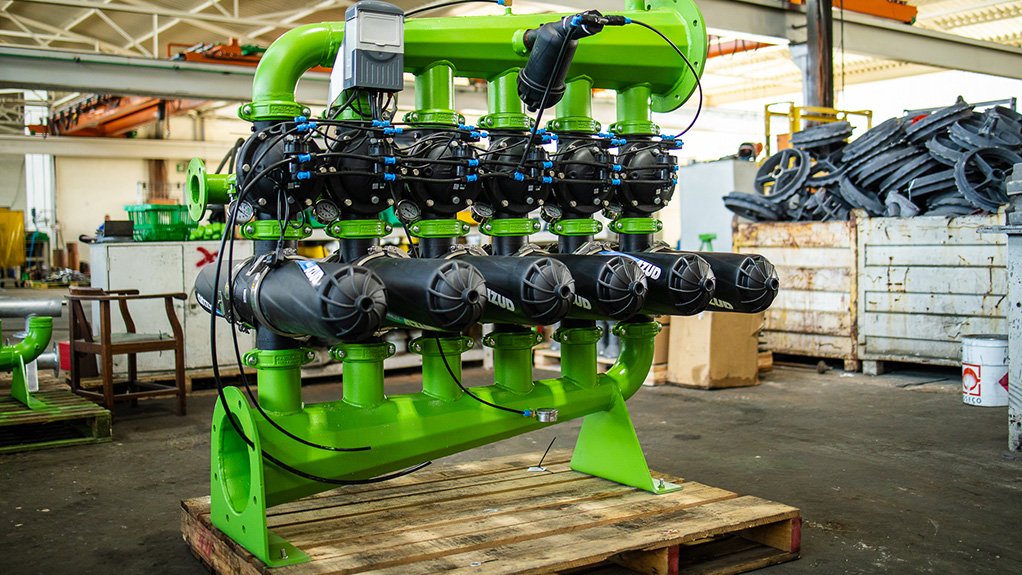The correct filtration method for your irrigation system
When it comes to protecting your irrigation system, few things are more important than effective filtration. The correct choice of filtration method to protect your system against blockages is not a mere financial decision, numerous other factors must be kept in mind.
How do I choose the right system?
The purpose of filtration is to protect the irrigation system from particles that can cause blockages. The best filter is one that retains the largest percentage of particles that have a clogging potential for the emitters.
The choice of filtration is therefore guided by the choice of emitter. While some emitters clog easily, other types are less sensitive. Therefore, it is important to finalise the design of the drip or micro-system before determining the right method of filtration.
To specify the right filtration system, the designer must obtain the following information:
- The smallest flow path opening of the emitter (usually the value is divided by 7 to determine the degree of filtration).
- The water quality is important. What is in the water that needs to be removed to prevent clogging of the emitters? Are the particles to be removed organic or inorganic?
- The system's working pressure, as well as the volume of water that must be filtered.
What types of filtration systems are there?
There are three methods of filtration commonly used in agriculture. The decision between the different methods depends on the level of effectiveness desired.
- Disc filters, also known as ring filters, are available as two types: automatic ring filters and conventional ring filters. Today, automatic ring filters are most commonly used. The filter is made of several plastic discs, with small grooves stacked on top of each other.
- Screen filters use a rigid or flexible screen to separate sand and other fine particles out of water.
- Media filters, better known as sand filters, use material like sand to trap particles and filter water.
Each type of filtering has its unique advantages and disadvantages. There are a few characteristics that a designer should keep in mind:
- Working pressure and pressure loss through/over the filter.
- Effectiveness of the filter. If the filter is chosen to filter 130 microns, it is important to know the ability of the filter to remove particles larger than 130 microns.
- Volume of backwash water required. This water is no longer available for irrigation.
- Maintenance requirements of the system.
- Power required to backwash the filter.
The most effective filters usually have some challenges; the biggest of these is an ineffective backwash action. It can be compared to a vehicle's air filters. Probably the most effective filter in agriculture today, air filters are almost impossible to clean and usually need to be replaced. Such a system is not practical for irrigation filters.
A few practical thoughts
- The position of the filter is important. The filtration process should be located as close as possible to the area being irrigated. If this is not possible, secondary filters can be installed. These filters help protect the emitters from possible pipeline breaks that may occur between the primary filters and the irrigation block.
- A clogged filter that completely stops the flow of water (due to poor maintenance or any other reason) is still better than a filter that fails under the circumstances and lets the particles through to the emitters. It is preferable to clean filters rather than trying to clean the emitters.
- Choose the filter to be able to function effectively when the water source is at its worst. A system at the lower Orange River, for example, must be chosen to be able to handle the poor quality water when the river is in flood. The system must be able to handle the large amounts of sand and silt that come with the flood waters.
- In extreme cases, a combination of methods must be used to purify the water. Sometimes it is necessary to use settling dams to get rid of high volumes of sand and silt in the water before it is pumped to the primary filter.
- Always consult an expert when choosing your irrigation system and the right components to put together a successful system. The benefits of the correct choice of system and components will give you much more pleasure and income than the price you paid for them.
Contact Agrico at +27 21 950 4111 / info@agrico.co.za or visit www.agrico.co.za.
Written by Johan Visser and Grethe Bestbier
Article Enquiry
Email Article
Save Article
Feedback
To advertise email advertising@creamermedia.co.za or click here
Announcements
What's On
Subscribe to improve your user experience...
Option 1 (equivalent of R125 a month):
Receive a weekly copy of Creamer Media's Engineering News & Mining Weekly magazine
(print copy for those in South Africa and e-magazine for those outside of South Africa)
Receive daily email newsletters
Access to full search results
Access archive of magazine back copies
Access to Projects in Progress
Access to ONE Research Report of your choice in PDF format
Option 2 (equivalent of R375 a month):
All benefits from Option 1
PLUS
Access to Creamer Media's Research Channel Africa for ALL Research Reports, in PDF format, on various industrial and mining sectors
including Electricity; Water; Energy Transition; Hydrogen; Roads, Rail and Ports; Coal; Gold; Platinum; Battery Metals; etc.
Already a subscriber?
Forgotten your password?
Receive weekly copy of Creamer Media's Engineering News & Mining Weekly magazine (print copy for those in South Africa and e-magazine for those outside of South Africa)
➕
Recieve daily email newsletters
➕
Access to full search results
➕
Access archive of magazine back copies
➕
Access to Projects in Progress
➕
Access to ONE Research Report of your choice in PDF format
RESEARCH CHANNEL AFRICA
R4500 (equivalent of R375 a month)
SUBSCRIBEAll benefits from Option 1
➕
Access to Creamer Media's Research Channel Africa for ALL Research Reports on various industrial and mining sectors, in PDF format, including on:
Electricity
➕
Water
➕
Energy Transition
➕
Hydrogen
➕
Roads, Rail and Ports
➕
Coal
➕
Gold
➕
Platinum
➕
Battery Metals
➕
etc.
Receive all benefits from Option 1 or Option 2 delivered to numerous people at your company
➕
Multiple User names and Passwords for simultaneous log-ins
➕
Intranet integration access to all in your organisation

























